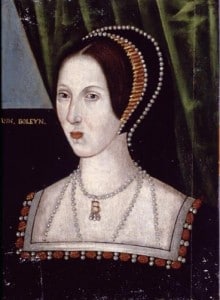 Anne Boleyn hadn’t even been tried and found guilty yet, but her household was broken up on this day in 1536. Chronicler Charles Wriothesley recorded:
Anne Boleyn hadn’t even been tried and found guilty yet, but her household was broken up on this day in 1536. Chronicler Charles Wriothesley recorded:
“And the morrowe after, beinge Satterdaie, and the thirtenth daie of Maie, Maister Fittes-Williams [Sir William Fitzwilliam], Treasorer of the Kinges howse, and Mr. Controoler [Sir Edward Poynings], deposed and brooke upp the Queenes househoulde at Greenewich, and so discharged all of her servantes of their offices clearlye.”1
There was obviously no question of the Queen being acquitted.
Wriothesley mentions that all of her servants were discharged, but some of them went on to serve Jane Seymour, who became Queen eleven days after Anne’s execution. Those who served both Anne and Jane included William Coffin, Anne’s master of the horse; Sir Edward Baynton, Anne’s vice chamberlain; John Smith, Anne’s surveyor; Jane Boleyn, Anne’s sister-in-law; Anne Gainsford, Lady Zouche; Bess Holland and Margery Horsman.
Also on this day in 1536, Henry Percy, Earl of Northumberland, wrote to Thomas Cromwell denying the existence of a pre-contract between himself and Anne Boleyn. He had been involved with Anne in around 1523, when she was serving Catherine of Aragon and he was part of Cardinal Wolsey’s household, but their relationship had been broken up by the Cardinal and Percy had married Mary Talbot – see The Early Life of Anne Boleyn Part Seven – The Butler, Chaplain, Courtier and Poet.
Percy had already denied the existence of a pre-contract in 1532 when his wife had sought an annulment of their unhappy marriage on the basis that their marriage was not valid because he had already been pre-contracted to Anne. Back then, Percy had sworn an oath on the sacrament in front of the Duke of Norfolk and the King’s canon lawyers, and the matter had been settled. The issue, however, was being resurrected in May 1536 in an effort to annul the King’s marriage to Anne.
Here is what Percy wrote to Cromwell on 13th May 1536:
“I perceive by Raynold Carnaby that there is supposed a pre-contract between the Queen and me; whereupon I was not only heretofore examined upon my oath before the archbishops of Canterbury and York, but also received the blessed sacrament upon the same before the duke of Norfolk and other the King’s highness’ council learned in the spiritual law, assuring you, Mr. Secretary, by the said oath and blessed body, which afore I received and hereafter intend to receive, that the same may be to my damnation if ever there were any contract or promise of marriage between her and me.”2
He was firm in his denial of the pre-contract and Cromwell was forced to give up on that idea.
Notes and Sources
- Wriothesley, A Chronicle of England During the Reigns of the Tudors, from A.D. 1485 to 1559, 37.
- LP x. 764